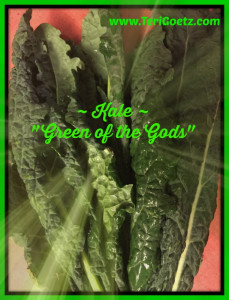DR. TERI GOETZ
Find the Cause. Treat the Root. Heal Yourself.
Find the Cause. Treat the Root. Heal Yourself.
Kale and Avocados: synergistic superfoods (& recipe) PART I
The First Half of the Superfood Duo — Kale
When you eat certain foods together, the whole is definitely greater than the sum of the parts. Kale and avocados create one such perfect marriage. Kale is high in phytonutrients but some of them are fat soluble (like lutein and vitamin K). When you eat fat soluble vitamins WITH a fat, you absorb more of the nutrients. (Think salsa and guacamole). Let’s dive into the health benefits of two of my favorite foods: kale and avos! First, kale.
Kale—Green of the Gods
It is perhaps not a shocker to you that kale is mind-blowingly good for you – a true superfood. Lucky for us these days, it’s everywhere! Let’s talk about WHY this food is a must on your menu.
What’s not to love about a vitamin-loaded green that packs more Vitamin C into one 36 calorie cup than an orange does (without the sugar) and has 5 gm of fiber (yay for improved digestion and the help in eliminating regularly!)? It’s also one of the world’s best sources of Vitamin A –meaning it’s great for skin and hair and helpful in preventing some cancers. Not only that, but your immune system will love you for ingesting lots of kale because it’s packed with antioxidants that ravage free radicals. That’s not all…. It’s also anti-inflammatory, with over 10% of the RDA of omega 3s — and you know how I feel about that. Inflammation is the cause of most disease.
There is even more about this green of the gods! Kale also contains:
Vitamin B6. Important in red blood cell production, carb metabolism, brain and nervous system function. (For instance, three key neurotransmitters— GABA, dopamine, and serotonin—all require vitamin B6 for synthesis.) Researchers in Japan found that there was a higher risk of depression in those who had low levels of dietary B6. Interestingly, another research study showed this link to be even more powerful when dietary folic acid is inadequate, as well. (PS Folic acid is a nutrient that works with vitamin B6 in the brain and nervous system chemistry and, um, is present in avocados!)
Lutein, a carotenoid (organic pigment in plants), is highly concentrated in the eye—especially the macula. Therefore, lutein is great in helping to prevent macular degeneration. It’s also good for the eyes in general and preventing cataracts. In addition, it is being shown to support brain health and functions like learning and memory.
Iron. You might know that iron helps with the delivery of oxygen to every cell in your body and is a crucial part of blood. But, did you also know it helps our immune system? It helps build healthier T-cells and aids the ability of the white blood cells to consume bacteria in our bodies, while also helping with muscle function and energy production, as an essential element in hemoglobin.
Chlorophyll. Also fat soluble, this pigment is similar in structure to the heme in hemoglobin! Research is showing that chlorophyll binds to certain carcinogens, and prevents them from being absorbed. Chlorophyll also works as an antioxidant and is considered a natural internal deodorant (that’s always nice!).
Indole-3-carbinol. This is found in all cruciferous veggies and can help protect against several cancers, including colon.
Calcium. Nature’s best delivery system for this vital mineral, kale has more calcium than milk. Considering that milk is inflammatory and kale anti-inflammatory—you do the math. Calcium is used for many bodily functions but for adults, the key benefits are the prevention of osteoporosis, the building of cartilage, and multiple benefits to heart, nerves, and muscles. Oh, and getting back to our concerns with weight? Calcium helps us maintain an optimal body weight.
Allow me to continue just a bit more about this magical green. Honestly the hits keep on coming. So, in addition to all the above, kale also helps detoxify your body as it’s so high in fiber and sulphur (benefits to liver function) and it helps reverse Vitamin K deficiencies.
Vitamin K hasn’t been talked about much in the past, but we are learning more and more about its importance in the body—for instance building bone, helping with blood clotting, and preventing heart disease. K and D work together so if you are deficient in either, the other doesn’t work as well in your body.
It turns out most of us are deficient in vitamin K—and kale can help you out with that. Vitamin K deficiencies have been linked to osteoporosis, cardiovascular disease, varicose veins, brain health problems, tooth decay, certain cancers like prostate, lung, liver, and leukemia, and infectious disease. Because it is a fat soluble vitamin, it’s best absorbed if you eat kale with some fat…. enter, the avocado!
Next week I’ll bring you the glorious avocado and a supercharged recipe combining it with kale!


